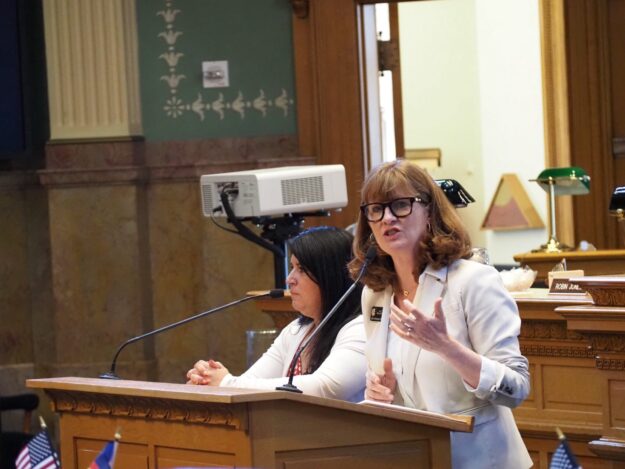Widgetized Section
Go to Admin » Appearance » Widgets » and move Gabfire Widget: Social into that MastheadOverlay zone
Colorado lawmakers set to wrap up special session on lowering property taxes

House Speaker Julie McCluskie, a Dillon Democrat, speaks on the floor of the Colorado House of Representatives alongside Minority Leader Rose Pugliese, a Colorado Springs Republican, on Aug. 28, 2024 (Sara Wilson/Colorado Newsline).
A special legislative session on property taxes is nearing its conclusion as the Colorado House of Representatives voted through the session’s main bill and the Senate gave a provisional approval on Wednesday evening.
That sets the course for a Thursday finish on the second special session concerning property taxes in less than a year.
The House voted 45-18 on House Bill 24B-1001, with many progressive Democrats siding with three of the chamber’s most conservative lawmakers against it — though their reasoning was very different.
The circumstance of the session and process for how the bill was researched and written did not sit well with some Democrats.
“I am happy to come here any time we have a chance to do the people’s business. But this bill isn’t that. We’re here doing this special session because a decision was made to negotiate with oligarchs,” Rep. Stephanie Vigil, a Colorado Springs Democrat, said on the floor ahead of the final vote. “This is a deal that was drafted and stakeholdered in a back room by people who will never have to answer to you for the outcomes.”
The bill at hand was presented as a compromise deal to persuade backers of two property tax initiatives to remove them from the November ballot. The conservative groups Advance Colorado and Colorado Concern are behind Initiative 50, which would set a cap on how much property tax revenue can grow per year, and Initiative 108, which would sharply cut assessment rates across the state.
Gov. Jared Polis, a Democrat, and other lawmakers feared a substantial loss of property tax revenue because of those initiatives, which if passed in a statewide vote would threaten school districts, fire districts, local governments and other taxing entities that rely heavily on that type of revenue. In exchange for modest cuts and other provisions in HB-1001, the conservative groups pledged to withdraw the initiatives and not submit similar ones for six years.
The bill is essentially an extension of Senate Bill 24-233, which lawmakers passed in May. It cuts residential assessment rates further, cuts some non-residential rates that weren’t included in SB-233 and sets revenue growth caps that are not as stark as the one proposed in Initiative 50. The average homeowner would see less than $100 in savings.
Polis called for the special session after he and others negotiated the deal, not wanting to risk passage of those two initiatives as backers prepared an expensive marketing effort to appeal to voters. Lawmakers then had an ultra-compressed timeline to review the bill and introduce other legislation.
“It is our job to make law. This floor needs to be respected. We only work for the people. We may work with others, but we only work for the people,” said Assistant Majority Leader Jennifer Bacon, a Denver Democrat who voted against the bill. “A vote for this or a vote against this — it is not a vote against the people on this floor. It is a signal to understand that if we are ever put in this position again, there are people willing to not be pushed.”
The Republicans who voted against the bill said they think voters should be able to decide on the two initiatives.
House Speaker Julie McCluskie, a Dillon Democrat, and Minority Leader Rose Pugliese, a Colorado Springs Republican, defended the bill’s process and necessity.
“Is it a move to play defense right now? You bet it is,” McCluskie said.
In addition to staving off the initiatives, the bill would also provide additional — though minor — relief to homeowners experiencing sharp increases in their property tax bills, they said.
After the House passed the bill, it moved over to the Senate. The Senate Appropriations Committee passed it unanimously.
The Senate Finance Committee also approved a bill that makes a property tax exemption for agricultural equipment permanent. But that committee then killed a proposed ballot measure that would have dissuaded backers of property tax ballot initiatives by giving more local control to property tax decisions. The measure, sponsored by Rep. Mike Weissman, an Aurora Democrat, would have required voters in a local jurisdiction to independently approve any statewide initiatives that affect property tax revenue.
It passed the House by the narrowest margin possible — it needed two-thirds support because it was a constitutional amendment — but the Senate committee then killed it by request of sponsor Sen. Chris Hansen, a Denver Democrat, because it did not have the necessary support in that chamber.
The Senate began debating HB-1001 around 5 p.m on Wednesday and wrapped up around 7 p.m. They passed both that bill and the agricultural equipment bill on second reading. That means they can vote on their final passage on Thursday and wrap up the special session in time for Labor Day Weekend.
Editor’s note: This story first appeared on Colorado Newsline, which is part of States Newsroom, a nonprofit news network supported by grants and a coalition of donors as a 501c(3) public charity. Colorado Newsline maintains editorial independence. Contact Editor Quentin Young for questions: info@coloradonewsline.com. Follow Colorado Newsline on Facebook and X.


